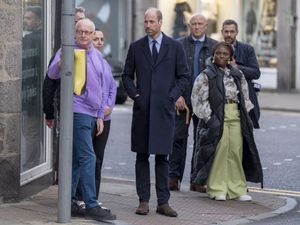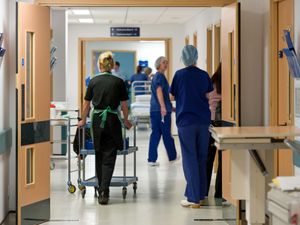Disabled father says welfare reforms have prompted fear
Ryan Swanepoel was diagnosed with muscular dystrophy at the age of 20 and uses a wheelchair after losing mobility in his arms and legs.

A father with muscular dystrophy (MD) said people have been left feeling “fearful” about how benefit cuts might affect them because of a lack of clarity from the Government.
It comes after Rachel Reeves confirmed further changes to welfare in her spring statement on Wednesday, which have prompted severe criticism from charities.
The Office for Budget Responsibility (OBR) said the Chancellor’s benefits reform plan will save an estimated £4.8 billion in 2029-30, lower than the Government’s claim last week of a more than £5 billion saving.
The main savings are expected to come from tightening the personal independence payment (Pip) eligibility, cutting payments for around 800,000 claimants.
Some 370,000 people currently on disability benefits will lose on average £4,500 per year in 2029/30, as a result of the changes, according to the Government’s own impact assessment.
Other savings are expected from slashing the level of health-related universal credit, which will be halved for new claims from next year and then frozen for both new and existing claimants until 2030.

Ryan Swanepoel, 41, who was diagnosed with MD at the age of 20, uses a wheelchair after losing mobility in his arms and legs, and relies on a wheelchair-accessible vehicle (WAV) funded through Pip to help with daily tasks such as shopping trips and going to appointments.
Under changes to Pip, from November 2026, people who do not score at least four points on the daily living part of the payment – concerning whether they need help with activities such as preparing food and washing and bathing – will lose their payment.
Mr Swanepoel said there is a “mental fear” following the announcements and urged the Government to be clearer in its messaging, especially around those living with lifelong health conditions.
“I think it’s the mental fear that comes with all these announcements,” Mr Swanepoel, from Great Kingshill in Buckinghamshire, told the PA news agency.
“It’s the wording from the Government. It isn’t enough.
“They announce things like ‘we will protect those with severe conditions’, but what is classed as a severe condition? Many of us don’t know what category we fit in.
“There’s not enough information to put us at ease or make us know what to do.”
Work and Pensions Secretary Liz Kendall last week said people on universal credit (UC) “with the most severe disabilities, and health conditions that will never improve” will not be reassessed for their benefits so as “to give them the confidence and dignity they deserve”.
Mr Swanepoel lives with his wife Mary, who is his full-time carer and has health conditions including fibromyalgia, and their three children aged seven, 13 and 15.
He told of his fears about the changes to both the health element of UC and Pip.
He said: “I fall into that category, so I’m on lower capability to work because I physically cannot work. When I’ve been told that (UC) might be taken or taken away, that’s a hole I can’t fill.
“With the Pip assessment, if that gets taken away from my wife or me, that’s another hole we cannot fill.”
The Government has said it will “guarantee” people found to have limited capability for work and work-related activity (LCWRA) before April next year and who retain that status after reassessment will not see their UC health element entitlement changed.
Mr Swanepoel said the Government has left a “gap” for carers, including his wife, who also receives Pip to provide round-the-clock care for him.
The Government’s impact assessment estimated a £500 million cut in carers’ benefits by 2029/30, with around 150,000 people not receiving carer’s allowance or the carer element of UC as a result of the changes.
Mr Swanepoel said: “The impact on my wife is huge because people overshadow the carers involved and the families that have to do everything to fill the gap that has been left by the Government.”
He fears he will not be able to feed his children or pay rent because he feels the “broken” welfare system is not doing enough to support people living with lifelong disabilities.
“What frustrates me the most is I completely understand the whole system is broken and is being abused by the wrong types of people, yet those with lifelong conditions like myself have the opposite mindset,” he said.
“When the system is abused by those who shouldn’t be entitled to it, it leads to those who have no choice being rendered vulnerable and fearful every day because we rely on universal credit for our rent and to feed our children.”
Mr Swanepoel’s local authority has provided him with a specialist single bed, but he has since set up a GoFundMe to raise £3,500 for a medical double bed for he and his wife to share, which he feels is necessary for their relationship.
An estimated 250,000 more people, including 50,000 children, will be left in relative poverty after housing costs by the end of the decade as a result of the Government’s squeeze on welfare, its own impact assessment said.
Ms Reeves said she is “absolutely certain” her reforms will not push people into poverty, insisting the Government’s support to get people into work will mean they are “much less likely to be in poverty”.





